How to become (and stay) a popular morning personality and successful program director for 3 decades? We can learn it from 104.6 RTL Berlin’s Arno Müller.
The well-known German morning host and PD considers his teambuilding, delegating and self-regulating policy “the biggest secret” behind their achievements, he said during Arno Unplugged at Radiodays Europe 2013. He also spoke about creating successful radio brands and winning morning shows. “You need to give something to get something.”
“I knew that I wanted to be on the radio”
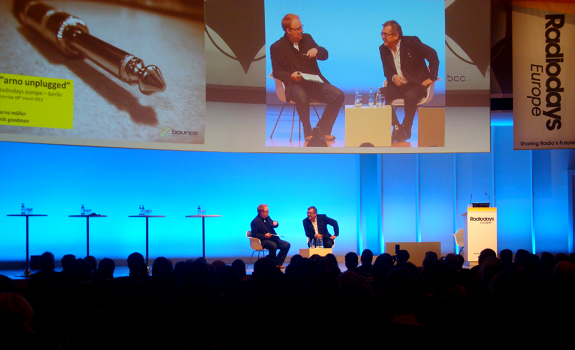
Program director and morning show radio personality Arno Müller of Berlins Hit-Radio 104.6 RTL (right), here on stage with session host Nik Goodman (left), already was ‘radio minded’ at a very young age (photo: Thomas Giger)
Become a leading personality
It was a rare opportunity to see Arno Müller (1962) on stage, as he has mixed emotions about it. In his Radiodays related column on the station website, he clarifies that he isn’t a consultant who speaks in order to sell solutions for problems that people didn’t know they had in the first place. And he has a second reason, too. ‘Where is the line between sharing experience; the meaningful transfer of knowledge to young radio people, and meaningless disclosure of strategies and tactics to the competition?’, the 2012 winner of the German Radio Award for Lifetime Achievement writes. He got the award for his long-time, ongoing success at Berlins Hit-Radio which allowed him to inspire a whole generation of radio presenters.
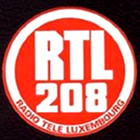 Build your network early
Build your network early
Müller grew up listening to the Radio Luxembourg, including the British program on AM 208. “As a kid, I knew that I wanted to be on the radio. I had my little self-built studio at home and produced my own radio shows.” At the age of 17, Arno met a record rep who offered to hand over a demo tape to his connections at hr3, the Pop format of public broadcaster Hessischer Rundfunk in the western part of the (back then, still divided) country.
Instruct interview candidates thoroughly
The young DJ got invited for an audition in Frankfurt, where the station hired him for the midday show on a trial basis. No production work, no night shifts… straight to midday’s! Five minutes before his first program on hr3, his PD called – asking him to interview the German comedian and television host Jürgen von der Lippe, who was around for some reason. “I wasn’t prepared for him; nothing. I told him: Jürgen, you need to help me out. This is my first radio show; just don’t be hard on me. He said: okay. I just needed to ask him one question and he was talking for 3 minutes; funny stuff. It was a very good show.”
“I said: I don’t know how, but we need to be on the air”
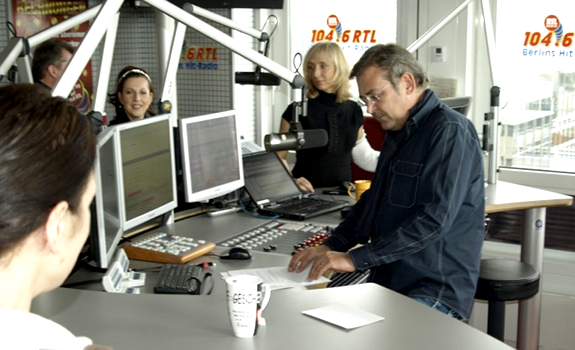
Arno Müller, here in the broadcast studio of 104.6 RTL, recalls that the first months in the fall of 1991 were all about pioneering with satellite channels and remote studios as they didn’t had a headquarter in Berlin yet (photo: RTL)
Do some radio job-hopping
After gaining radio experience for about a decade at several radio stations – from public broadcasters hr and SR to commercial stations RPR [now RPR1.] and Gong 97.1, according to the Radio Journal – Arno Müller joined Radio Luxembourg as a program director in 1990. There he wasn’t on the air, as “there was so much to do in changing this massive big ship into a small boat”. There was one problem: the station’s transmitter in Luxemburg was only able to beam into a small part of Germany. The 104.6 in Berlin, for which they successfully applied in 1991, was RTL’s first license inside the country. Great news! But followed by two challenges: distribution and a deadline.
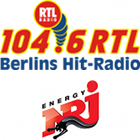 Have a solution-oriented attitude
Have a solution-oriented attitude
Their competitor ENERGY, a station with the same format, was about to start broadcasting in the capital very soon. RTL Berlin on the other hand, still had to be built from the ground up. When Müller came back from a market visit as orientation, he was determined to kick off as soon as possible. “I said: I don’t know how, but we need to be on the air.” On September 9th, 1991 – although one week later than ENERGY – 104.6 RTL did sign on.
Hire established radio personalities
The interesting thing here was that 90% of the program actually came from a temporary studio at the Luxemburg headquarters, 500 miles away, where they would hang posters of the Berlin skyline on the wall. RTL rented a satellite uplink (“for, I think, 1.5 million Marks a year”) to get the signal from the on-air studio in Luxemburg to the transmitter site in Berlin. To add some localness, they produced one show from the city. “Rik de Lisle was one of the big stars in Berlin. I hired him from RIAS 2 [now 94,3 rs2]. He did a midday show, out of a remote broadcast car, from different places.”
“You need to attack yourself”

104.6 RTL program director and radio personality Arno Müller states that as a number 1 station, your marketing effort should be aimed at defending your position, rather than challenging your competition (photo: Thomas Giger)
Design clever radio promotions
Hoping to create talk of town and brand & frequency awareness, 104.6 RTL was the first with American-style radio promotions in Berlin. One of their early-day stunts was The Money Man, who was walking around the capital all day, asking people which station they listened to. Those who answered ‘104.6 RTL’ would win 100 Mark. Müller recalls that when they moved to their own studios at Berlin’s Kurfürstendamm on January 1st, 1992, the station already was number 1 in its 14-39 year-old target audience demographic. “I think it was luck, but also a planned success. We did tons of research, and knew we couldn’t fail.”
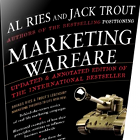 Use defensive marketing tactics
Use defensive marketing tactics
About 21 years later (according to the MA 2013-I) the station has 223.000 listeners per average hour, while today’s main competitor 94,3 rs2 reaches half of it (119.000 = 53%). As top station, 104.6 RTL is “playing defense” in terms of marketing. They follow Al Ries and Jack Trout’s Marketing Warfare [book] strategy that as a market leader, “you need to attack yourself”, so improve your product to preempt your competition’s moves.
Put team spirit first
“The first time we became number 1 in Berlin and Brandenburg” is the best moment of Arno Müller’s career so far. Second best on his list is a ratings book from 2011. “After we were number 1 with 135.000 listeners per average hour, the station went up again over 200.000. I thought, in this media world today, this would never be possible.” In answer to the question if staying on top requires a lot of investments, he explains that a radio station’s greatest asset is its team. “The most important is that you love your staff and your staff loves the station – and doesn’t leave you because somebody gives them 100 Euros more. I think RTL is more than money.”
“It would be a very boring show”
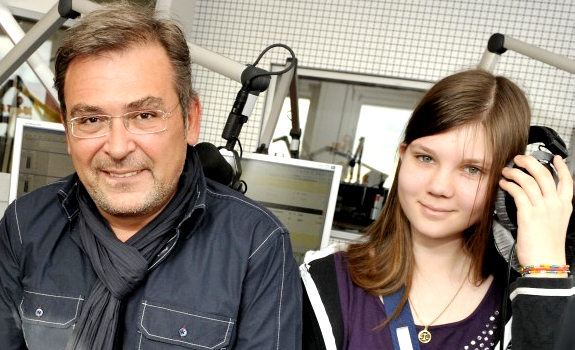
Arno Müller, here with a young listener during an open house at 104.6 RTL, says that his morning show team and programming department do the daily work – and that he’s just overseeing and directing things (photo: RTL )
Invest in radio talent
As launch program director of the station, Arno Müller actually never intended to do the morning show. The reason was that 104.6 RTL had to be up and running in short amount of time. “I didn’t had a morning host, so I told the team: okay, let’s try and then find somebody who’s replacing me.” They found inspiration at American AM shows like the Morning Zoo on Z100, named it Arno und die Morgencrew (Arno and the Morning Crew) and… the rest is history. “After 3 months, my boss came to me and said: now you can’t move out there anymore.” RTL is heavily investing in the program, even in today’s economy. Arno’s morning crew consists of many different sidekicks, producers, and comedy writers.
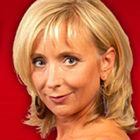 Build long-term radio teams
Build long-term radio teams
The fact that many team members work at 104.6 RTL for over a decade is remarkable. The on-air cast includes co-host Katja Desens (photo) and ‘the almost-famous Lucas’, a musician who plays piano and sings songs, as well as other sidekicks and characters. Traffic updates come live from a studio at Berlin airport, where the station has dedicated airplanes and pilots to circle above the city. A huge cast, for a big show.
Define morning show USP(s)
“There are many ways of doing morning shows, and you need to find your way”, Müller replies to the question whether a small team could be equally successful. His program is production-intensive, as it includes many comedies. The choice to go for a position of ‘Berlins lustigste Morgensendung’ (‘Berlin’s most funny morning show’) was based on research in 1991, when “everything in Berlin was journalism, journalism, journalism. There was no fun on the air, there were no games and contests, and there was no music approach.” For show prep, the radio host completely relies on his team. He admits that it would be a different program if it would be just him and a microphone. “It would be a very boring show.” After 10 AM, when the air shift is over, he’s putting on another hat:
[audio:http://www.radioiloveit.com/wp-content/uploads/arno-muller-104-6-rtl-radiodays-europe-2013-01.mp3|titles=Arno Müller about his double role as morning host and PD]
“I’m not at the end; I’m at the beginning”
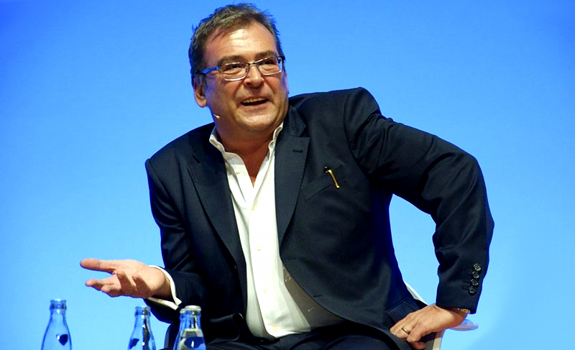
When you’re leading a creative team, minimizing your involvement is much better than micro-managing your staff, is Arno Müller’s experience as a program director at 104.6 RTL in Berlin (photo: Ulrich Köring / RADIOSZENE)
Maximize your creative output
Arno Müller sees his morning crew as “a living environment” and deliberately chooses not to be involved in the production of the show. When it comes to programming, he’s leading the station in a similar way – what he does is assemble a team and let it work. “I learned over the years that you have two ways to manage a team or radio station or any creative environment.” His hands form the left and right side of a pyramid. “You can be the little narrow hole [at the top] where everything needs to get through. You will have a lot of work and minimize the outcome of your team tremendously, because everything needs to go over your desk.”
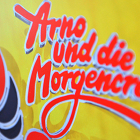 Let creatives work independently
Let creatives work independently
While he’s reversing the pyramid and thus shaping a funnel, he continues: “I decide with my team: what is the right thing to do? Then I let them work, and try to only put it in the right direction.” In his experience, delegating is much better than micro-managing: “I think that’s the biggest secret of 104.6 RTL. I’m not at the end; I’m at the beginning.” He explains how he motivates his team, and keeps it running like a machine over a long period of time:
[audio:http://www.radioiloveit.com/wp-content/uploads/arno-muller-104-6-rtl-radiodays-europe-2013-02.mp3|titles=Arno Müller about his loyal and self-regulating team]
Program flexible speech breaks
Arno und die Morgencrew play between 6 and 9 songs an hour, depending on the commercial load. Their speech breaks are not limited to a certain amount of minutes, because they rather use the entertainment value of every talk break or benchmark to determine its duration. One day, they’ve noticed that many people are frustrated about getting put ‘on hold’ for a long time when calling a company or government institution. So they now offer listeners a chance to get even, by calling these companies or agencies – putting the other guys on hold, or connecting them from one person to another – all on the radio. Die Warteschleife (The Waiting Line) may take up to 10 or 12 consecutive minutes!
“This stuff is testing through the roof”
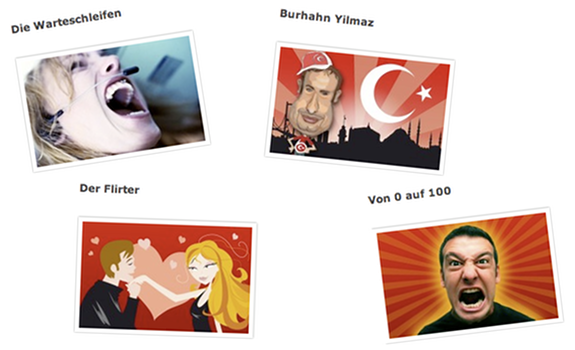
Arno Müller finds that candid phones, prank calls and comedy bits work magic for his morning show (images: RTL)
Research morning show content
“We are testing all of our bits”, Arno Müller refers to focus groups and auditorium content testing. Research indicates that The Waiting Line is actually the most successful feature of the entire show. “When you look at the lines, it goes second by second up, and up, and up, and up. Even people that don’t like it in the beginning like it in the end. After these 10 minutes you are at 90 or 95% positive in a room of tested persons. You will never have a song testing that high as this bit. So we don’t care if it’s 10 minutes.”
[ I would be interested to know more about the actual listening behavior of listeners who are not familiar with the bit and not immediately like it. Will they give it a chance and listen for 10 minutes, or tune out after 1 or 2 minutes? ]
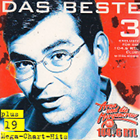 Limit untested features 1:30
Limit untested features 1:30
Müller adds that in terms of more standard bits and stories, people do have a significantly shorter attention span. “When we talk about our stuff, after 1’30” nobody wants to hear it anymore, so we try to stop it after that. If it is good, it can go forever”, he says about their best features (also released on CD). Experiments should be done carefully: “If it’s not good, it can destroy a lot. When you don’t know what you’re doing, be as short as possible.”
Create theatre of mind
During his more than two decades on 104.6 RTL, the program director and radio presenter has learned that the most effective morning show features are candid phones. They work so well that every hour of the morning show includes one. “We have many different candid phones or set-ups where the listener looks through the key hole”, he explains. One of them is Von 0 auf 100 (From 0 to 100) where they’re pushing boundaries with what people can take. [What keeps you listening is probably that you’re curious what happens next – and if and when ‘victims’ lose their patience.] “This stuff is testing through the roof”.
“If they don’t know you, they cannot love you”
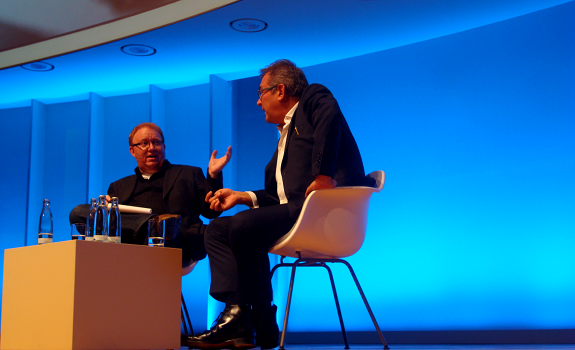
Despite the popularity of comedy bits in morning shows, 104.6 RTL morning host Arno Müller (sitting on the right) believes that a radio personality should still first and foremost be a real human being (photo: Thomas Giger)
Share personal & authentic stories
Is there a magic ingredient to a brilliant morning show? “What’s much more important than the comedy breaks – that’s what makes it funny – are the characters of the show”, the veteran radio programmer and morning personality says. “If you are on a morning show, you need to be real and authentic. If you’re in a bad mood, be in a bad mood. Tell people real life stories. We are talking about many private things out of our lives; we make jokes out of it or we are serious about it.” In Arno Müllers’ experience, listeners will only bond with you if you open up yourself and share personal details . “If they don’t know you, they cannot love you. You need to give something to get something.”




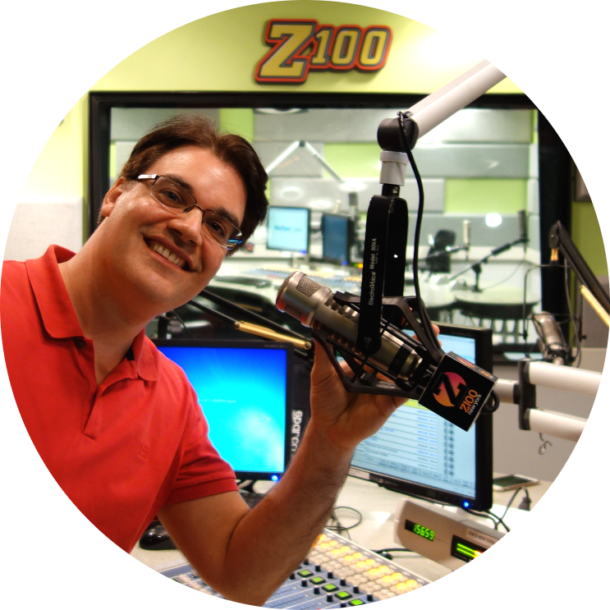
Add Your Comment